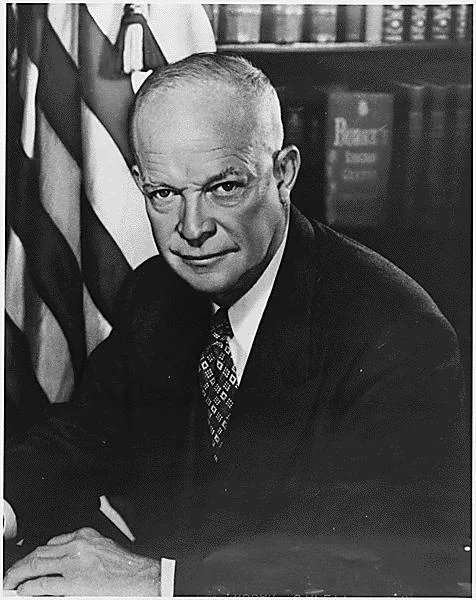Elections: Dwight D Eisenhower
Quote of the Day:
Only our individual faith in freedom can keep us free. - Dwight D Eisenhower
Politics ought to be the part-time profession of every citizen who would protest the rights and priviledges of free people and who would preserve what is good and fruitful in our national heritage. - Dwight D Eisenhower
Elections: Dwight D Eisenhower
Day 16 VoCaBulary:
Congress
citizen
free
different
ethics
advertisement
amendment
turnout
Dwight D Eisenhower: Dwight David Eisenhower was the 34th president of the United States. Eisenhower was president from 1953 to 1961, serving two terms.Eisenhower was born on October 14, 1890 in Denison, Texas. General Eisenhower was the Supreme Allied Commander in World War II. During hi spresidency, Eisenhower increased social welfare programs. He worked to bring peach to the world; in 1953, he helped end the Korean War. Eisenhower helped create the Southeast Asia Treaty Organization (SEATO) in order to stop the spread of communism. In 1954, after the Supreme Court ruled that racial segregation in schools was illegal, Eisenhower sent troops to Little Rock, Arkansas, to help integrate the public schools. Eisenhower died in 1969 in Washington, DC.
Discovering Elections:
Whom did president Eisenhower have to campaign against when he was running to become president of the United States? Dwight D Eisenhower campaigned against Adlai E. Stevenson in 1952 and 1956.
What are some of the responsibilites of American citizens? Every person is expected to obey the laws of the community, state and country in which he or she lives. All Americans are expected to respect the rights of others. All persons living in the U.S. are expected to pay the income taxes and other taxes honestly and on time.
Are there other ways to vote instead of going to polls on election day? Yes, if you are overseas working or in the military or for any other reason you may vote using an absentee ballot.
What is a motto? What is the national motto of the United States? When did it become our motto? Where can you find our motto? When was it approved by legislation? Who introduced the legislation? What American president signed it into law? How did Francis Scott Key's writing influence the wording of our national motto?
In 1956 the President Eisenhower approved a Joint Resolution of the 84th Congress declaring IN GOD WE TRUST the national motto of the United States. Most Americans are only familiar with the first verse of Francis Scott Key's 1814 poem The Star Spangled Banner, but the fourth verse includes: And this be our motto: "In God is our trust."
The national motto originated with Secretary of the Treasury Salmon P. Chase during the Civil War. Prompted by a letter from Rev. M. R. Watkinson, of Ridleyville, Pennsylvania asking for a recognition of "the Almighty God in some form in our coins.", Chase requested Congress to pass a law changing the composition of the 2-cent piece to include the motto "In God we trust". The law as passed on April 22, 1864. Eventually the motto appeared on many U.S. coins and currencies.
When the double eagle and eagle of new design appeared in 1907, it was soon discovered that the motto had been omitted. In response to a general demand, Congress ordered it restored, and the act of May 18, 1908, made mandatory its appearance upon all coins which it had heretofore appeared. The act approved July 11, 1955, makes appearance of the motto "In God we trust" mandatory upon all coins of the United States.
Why do we have local government? What are some of the responsibilites of local government?
Local governments are also charged with building and maintaining local roads. Local governments must also provide snow removal, drainage and other services to keep the roads safe. Another responsibility of some local governments is the management of public utilities, like electricity, natural gas, water and garbage collection. Local governments are also responsible for the majority of public safety agencies and provisions. Those include institutions like fire departments, police departments and an ambulance service. Local governments work with state and federal governments to maintain a public school system. Finally, local governments are responsible for maintaining a parks system and providing residents with safe recreation opportunities.
Who are your local government officials?
What does the work impeach mean? What steps are involved in the impeachment process in America? Which of the US presidnets had to face impeachment proceedings and on what grounds were they impeached?
Impeach: to accuse (a public official) before an appropriate tribunal of misconduct in office.
Removing an official from office requires two steps: (1) a formal accusation, or impeachment, by the House of Representatives and (2) a trial and conviction by the Senate. Impeachment requires a majority vote of the House; conviction is more difficult, requiring a two-thirds vote by the Senate. The vice presidnet presides over the Senate proceedings in the case of all officials except the president, whose trial is presided over by the chief justice of the Supreme Court.
Two U.S. presidents have been impeached: Andrew Johnson, the seventeenth chief executive, and William Clinton, the forty-second.
Johnson violated the Tenure of Office Act{prohibited the president from dismissing office holders without the Senate's approval}by attempting to oust Secretary of War Edwin Stanton and was impeached in 1868. But the Senate was one vote short of the two-thirds majority needed to convict, and Johnson was acquitted May 26, 1868.
Clinton was impeached on two counts, grand jury perjury and obstruction of justice, with the votes split along party lines. The Senate Republicans, however, were unable to gather enough support to achieve the two-thirds majority required for his conviction. On Feb. 12, 1999, the Senate acquitted President Clinton on both counts. The perjury charge failed by a vote of 55–45, with 10 Republicans voting against impeachment along with all 45 Democrats. The obstruction of justice vote was 50–50, with 5 Republicans breaking ranks to vote against impeachment.



